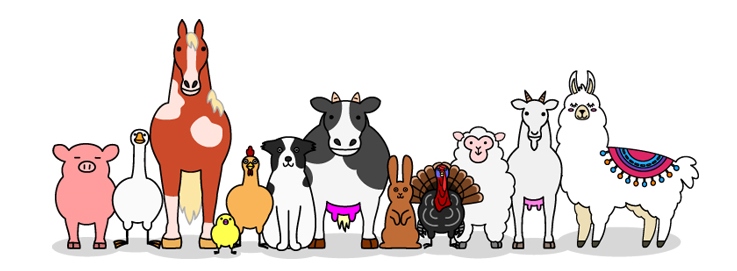Main Content
FOR THE PURPOSES OF THE NJ 4-H CONTEST, WE ARE NO LONGER AWARDING POINTS FOR WEEK #2 ACTIVITIES; HOWEVER, THE ACTIVITIES ARE STILL AVAILABLE
Welcome to the second week of our online learning!
You have from now until the end of Friday, April 24 to complete as many of these activities as you like. They are all optional, but you will earn up to 5 points for your club for each activity you complete. At the end of our seven weeks, the five top-scoring clubs will earn $200. We will also award up to 10 prizes of $100 to clubs scoring just outside of the top five. Good luck and enjoy learning and sharing about your project animals!
Alpaca/Llama
DRAW/PAINT: Alpacas and llamas are interesting creatures! They make great subjects for artists. In this activity, you are the artist! Using pencils, markers, crayons, paint, or pastels, you will create a picture of an alpaca or llama. Complete this Activity.
Dairy Cattle
CREATE: In a post from January of last year, we introduced you to the six recognized breeds of dairy cattle. After reading about each, you will choose one and create a one-page advertisement that promotes it as the breed of choice. Complete this Activity.
Dog
TRAIN: Hopefully you have spent more time with your dog since you have been at home. Now is the perfect time to teach your dog new tricks. You will view a list of tricks from the AKC website and choose one to teach over the next few weeks. Complete this Activity.
Goat and Sheep (small ruminants)
WATCH: Our friends at University of Maryland Extension have developed a wealth of resources for goat and sheep producers. You will view the first 20 minutes of a webinar about the nutrients needed for proper growth and production of goats and sheep. Complete this Activity.
Herpetology
EXPLORE: We introduced you to hellbenders by profiling the work of a University of Kansas researcher, We are Bent on Learning about Hellbenders. You will explore one of the largest salamanders found in North America and learn how scientists are working to conserve them. Complete this Activity.
Horse & Pony
MAKE: This is a good time of year to know which plants are toxic to horses. Using a Rutgers fact sheet we recommend in a popular equine post, you will make a set of cards that will help you identify these toxic plants in your pastures and learn about each. Complete this Activity.
Poultry
TOUR: You can’t take a field trip to a poultry farm right now, but you can certainly visit one via a virtual 360 video tour. You will learn about large-scale egg production by visiting a high-tech farm in Canada. Complete this Activity.
Rabbit/Cavy/Small Animal
LEARN: It is helpful to learn the many parts of your project animal. It makes it easier to understand and communicate its strengths and weaknesses, and judges often ask about its parts. You will study the parts of a rabbit and then quiz yourself using a simple computer program. Complete this Activity.
Swine
JUDGE: We get a lot of products from pigs – including ham, bacon, sausage, and pork chops. You will evaluate four market hogs and determine which you think is the best (in terms of meat production). Once again, no experience necessary – give it a try! Complete this Activity.
